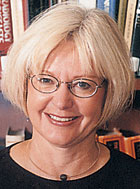The list of reasons to not smoke has gotten longer: School of Medicine researchers report that smoking interferes with ligament healing.
Studying mice with knee ligament injuries, the team discovered cigarette smoking impairs the recruitment of cells to the injury site and delays healing following ligament-repair surgery. They reported their findings in the Journal of Orthopaedic Research.

The researchers looked at the mouse medial collateral ligament (MCL), a ligament that supports the knee joint in both mice and people. Each year in the United States there are more than 20 million reported ligament injuries, and MCL injuries are the most common. They also are the most common injuries seen in competitive and recreational sports, although many go unreported.
“A lot of MCL injuries never make it to an emergency room because patients will have a sore knee but don’t seek treatment,” said Rick W. Wright, M.D., associate professor of orthopaedic surgery and a senior investigator on the study.
Previous studies have shown that the mouse provides a good paradigm for what happens in injured human knees.
“This is a good model for knee ligament injury, but it could be a model for ligament injuries anywhere in the body,” said co-investigator Linda J. Sandell, Ph.D., professor of orthopaedic surgery. “It’s likely the biology is transferable to other knee, elbow, shoulder and other ligaments.”
To look at the effects of smoking, Sandell, Wright and their colleagues used a system developed at the School of Medicine in which mice are placed inside smoking chambers six days per week. The mice don’t actually have cigarettes in their mouths, but they get enough passive fumes to “smoke” two cigarettes daily, the equivalent of a person smoking about four packs per day. Mice were placed in the smoking chambers for two months prior to MCL surgery and then again after surgery to mimic the behavior of humans who continue to smoke following an injury.

The soft tissue healing that occurs following ligament injuries occurs in stages. There is an immediate pooling of blood near the injury, the sort of hemorrhaging that will cause swelling right away. This initial response is followed by several days of inflammation, in which cells called macrophages flock to the injury site and secrete substances called cytokines and chemokines. Those, in turn, recruit more cells to assist in healing. The final stage of healing involves remodeling of the tissue and can continue for months and even years.
An earlier study found an increase in cell density and in gene activity to produce type I collagen in the first week following MCL injury, so researchers paid close attention to cell density, biomechanical function and gene expression during the first week after MCL repair. In mice exposed to cigarette smoke, cell density was lower and type I collagen gene expression was reduced.
“Our studies also have shown a decreased macrophage response that may help explain why we see this delayed or decreased healing response,” Wright said.
Sandell and Wright said their findings point to yet another reason smokers would do well to quit.
“Many patients don’t want to hear it, but these results suggest that smoking affects anyone who needs ligament-repair surgery.” Wright said.
“I counsel surgery patients to at least try to decrease smoking because, if nothing else, that will improve the healing of their surgical incisions. Quitting smoking is good health management regardless, but in patients having this kind of surgery, there are extra advantages.”
Wright and Sandell are now comparing mice exposed to smoke before MCL surgery to those exposed both before and after surgery to see whether ending smoking might assist ligament healing.
“Because ligament injuries usually occur suddenly, it’s unlikely people will stop smoking until after their injury,” Sandell said. “So we want to learn whether smoking cessation near the time of surgery might help reverse the healing delays we saw in this study.”